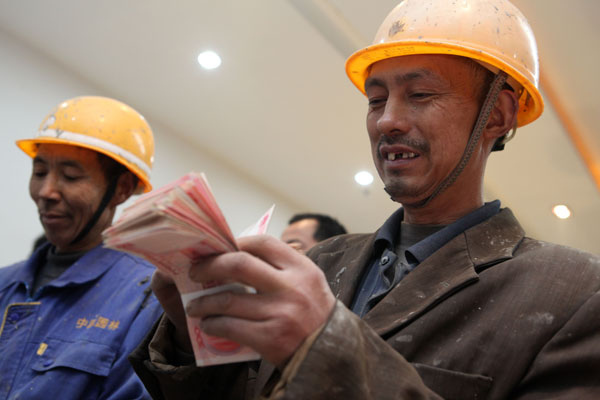Wrong to make employees the scapegoat
 |
|
Migrant workers receive their pay at a construction site in Dazu district, Chongqing, on Dec 26, 2013. [Photo/China Daily] |
During the first three quarters of this year, nine provincial areas including Beijing, Shanghai, and East China's Jiangsu province, raised the minimum wage by about 10.7 percent on average, fueling concerns about "overburdened employers". Raising the minimum wage is justifiable and has little to do with enterprises' struggling to lower their costs, said Beijing Youth Daily on Saturday.
Over more than two decades, land prices and financing costs have witnessed steady growth. That explains why more enterprises are struggling to yield more gains. Take for example their financing costs, which have been doubled by banks via a variety of back-door operations. Making employees the scapegoat is hardly a feasible solution.
And it is unfair for some employers to accuse better paid employees of imposing an extra burden on them. A higher minimum wage does not necessarily contribute to the financial burden on enterprises. Quite the opposite in fact, since a slow rise in employees' wages may result in shrinking productivity, which would further stifle an enterprise's long-term growth. That workers worked longer but produced little in the era of the planned economy is a case in point.
The argument that increased wages hurt employees eventually does not hold water, especially given the exponential rise in property prices across the country. The real estate prices in most cities have risen at least fivefold in the past decade or so, while the rise in wages has had barely a fifth of that momentum. The gap is by no means narrowing, making affordable housing a pie in the sky for an increasing number of wage earners.
What is more noteworthy is that Chinese residents' real purchasing power is much weaker than their salaries, because they still have a lot to pay when it comes to medical treatment and the education of their children. Those who have had the "luxury" of buying an apartment in first-tier cities may struggle more to pay the monthly mortgage. They cannot afford to be sick or lose their job, let alone enjoy the "dividends of development".
Employers are right to try and lower their costs, but blaming their employees for these costs only makes things worse.

























